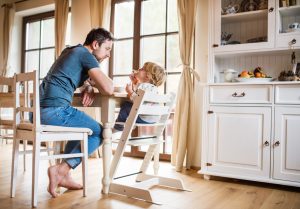 Discipline at zero months old? What is that?
Discipline at zero months old? What is that?
According to authoritative parenting principles, discipline is less about correcting behavior and more about teaching children skills that help them behave according to developmentally-appropriate expectations. In fact, the word “discipline” comes from the Latin word “disciplina,” which means “teaching.”
Highlights:
Building a warm, supportive relationship and developing healthy routines lays the foundation of trust, which is essential for successful discipline.
Parents can set limits for babies by preventing them from grabbing the wrong things (babyproofing an area), distracting them (using a silly voice), and redirecting (engaging them with a toy).
When children are looking for a reaction, ignoring their behavior (as long as it’s not dangerous) or using logical consequences that are directly related to the behavior can be effective.
|
Teaching your child to be safe and adhere to expectations can start, as we say, at “age zero,” and builds from there. Here’s how:
Months 0-3: Set The Stage
According to The American Academy of Pediatrics and authoritative parenting gurus, effective discipline relies on a warm, supportive relationship between parent and child. Otherwise, the AAP says, fear is the motivation for good behavior, rather than logic, personal responsibility, awareness of others, or respect for authority.
You can start building that relationship as soon as your baby is born by feeding him when he’s hungry, changing or dressing him when he’s wet or cold, cuddling him when he’s upset, and interacting with him in meaningful ways.
Pediatrician Harvey Karp, author of the best-selling book “Happiest Baby on the Block,” calls months 0-3 “the fourth trimester”—a time when it’s impossible to spoil your baby. In fact, several experts echo this by saying that consistently responding to your baby’s needs during this stage lays a foundation of trust between you, which is a main ingredient of successful discipline.
While strict schedules aren’t recommended at this stage, you can start developing routines. Routines help children know what to expect, which can lessen behavioral issues down the road, like fighting bedtime or the end of playtime. Routines also help you ensure that your baby is well-fed and rested, which can prevent unwanted behavior before it even starts because children tend to act out when they’re hungry or tired.
Months 4-9: Prevent, Distract, Redirect
With the advent of rolling, grabbing, sitting and crawling, you may want to shelf your dangly earrings for now and be sure your home is babyproofed.
At this stage, your baby doesn’t understand right and wrong; he’s simply learning about the world through his budding gross and fine motor skills and the sensory experience of grabbing things and putting them in his mouth. Not only is this normal, it’s also critical for his development. Here are a few ways to set limits for him without interfering with these important tasks:
- Prevent — Remove opportunities for him to grab or mouth things you don’t want him to. Aside from babyproofing, switch to stud earrings for a while and put tempting items like remotes on high shelves. This helps cut down on the times you need to use these next tactics:
- Distract — Remember, at this stage your baby isn’t testing limits; he’s curious. When you see him heading for a floor lamp he likes to shake, distract him by saying something like, “Oh look what I have here!” Then:
- Redirect — Offer him a toy or engage him by singing or going outside. If you have glasses that he can’t resist grabbing, or he keeps trying to put shoes in his mouth, simply offering him fun, mouth-friendly toys as an alternative usually does the trick.
Around 6 months old, your baby will begin to understand “no” by the tone of your voice when you say it. It’s a powerful word that can stop him in his tracks when he’s headed for a dangerous situation. Many experts warn, though, that using “no” too frequently can lessen its power, or even discourage curiosity. They recommend reserving it for times of danger or behavior like hitting or biting. An alternative would be: “We don’t play with trash because it’s dirty. Let’s find a toy you can play with instead.”
Note that in the example above, you explain the logic behind the rule, which is a key practice of authoritative parents.
Months 10-18: Ignoring & Logical Consequences
At this stage, improved memory, an understanding of cause and effect, and social curiosity bring new behavior challenges. A classic example is throwing food on the floor. Why do babies love to fling food? Remember, they’re curious. It’s interesting and fun for them to watch a blueberry roll across the floor while a dish of applesauce splats. They’re also interested in your reaction to it; if you laugh or get upset they may enjoy the attention.
So what’s a parent with applesauce on her shoes to do? One tactic is to ignore it altogether. Ignoring behavior (as long as it’s not dangerous) works wonders if your little one is looking for a reaction from you.
If ignoring doesn’t do the trick, try telling him with an emotionless face: “We do not throw food. We eat food.” At this stage, gestures reinforce the message (shaking your head while mimicking throwing food during the first sentence, nodding your head while mimicking putting food in your mouth during the second).
If he throws his food after you’ve said this, use a logical consequence (one directly related to the behavior): Tell him mealtime is over and take him out of his high chair. You can offer him a soft ball and say, “This is for throwing.” If you’re worried about him being hungry, try offering him a healthy snack a little later.
If he throws food at the next meal, repeat this process.
What About Time-Outs?
Experts who recommend authoritative parenting practices generally discourage time outs at this stage, arguing that children aren’t developmentally ready to understand them.
Don’t Forget to Use Humor
Sometimes your child’s behavior is not a laughing matter, but knowing when to use humor in discipline can help distract him and diffuse heightened emotion. In this article you can read advice about how to weave silliness into your discipline.
What’s Next?
When your little one enters the 18-24 month stage, you’ll need new tools in your discipline toolbox. In this article you can learn how to tackle your toddlers testing and tantrums.








